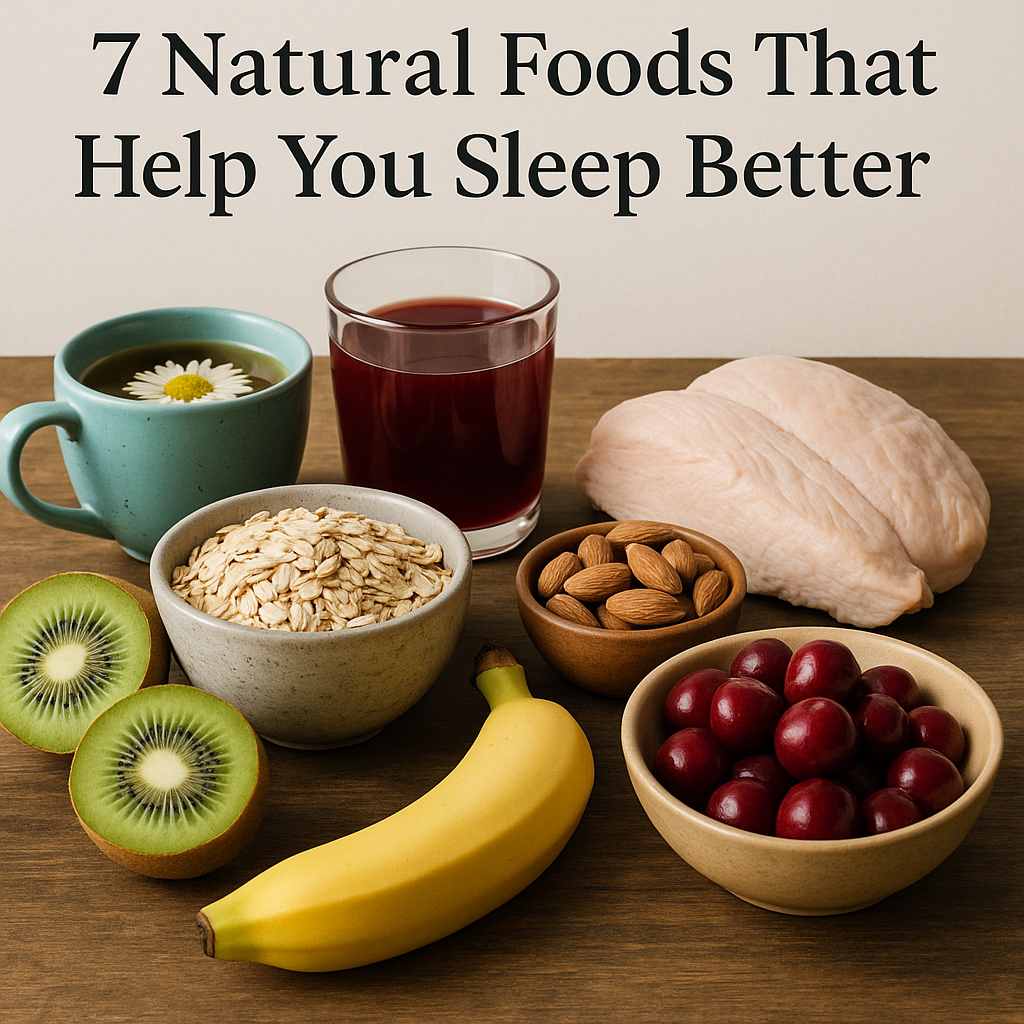Struggling to fall asleep or stay asleep through the night? You’re not alone. Sleep issues are increasingly common in today’s fast-paced world, and while sleep hygiene and routine play big roles, what you eat can have a major impact on how well you rest.
Some foods contain natural compounds like melatonin, magnesium, and tryptophan that support your body’s ability to relax and enter deeper stages of sleep.
Here are 7 sleep-promoting foods to include in your evening meals or bedtime snacks — all backed by science and naturally delicious.
1. Almonds
Almonds are a rich source of magnesium, a mineral that plays a role in over 300 bodily processes — including supporting relaxation and sleep.
Benefits:
- Help reduce cortisol (the stress hormone)
- Improve sleep quality, especially in people with insomnia
- Also contain melatonin, a hormone that regulates sleep-wake cycles
How to enjoy: A small handful of raw almonds before bed or added to yogurt or oatmeal.
2. Kiwi
This small green fruit might surprise you, but studies have shown kiwi can significantly improve sleep.
Why?
- High in antioxidants like vitamin C and serotonin (linked to sleep)
- Contains folate, which may impact sleep duration
- Low in sugar and easy to digest
How to enjoy: Eat one or two kiwis 1 hour before bedtime for potential benefits.
3. Tart Cherries (or Tart Cherry Juice)
Tart cherries (especially Montmorency variety) are one of the only natural sources of melatonin.
Benefits:
- Help increase sleep time and improve sleep efficiency
- Contain anti-inflammatory compounds that support recovery
How to enjoy: Drink 1/2 cup of tart cherry juice or eat a small bowl of fresh or dried tart cherries in the evening.
4. Turkey
If you’ve ever felt sleepy after a Thanksgiving meal, there’s a reason: turkey contains tryptophan, an amino acid that helps produce serotonin and melatonin.
Benefits:
- Naturally calming
- Helps reduce sleep onset time
How to enjoy: Pair with complex carbs like quinoa or sweet potatoes to help the tryptophan cross the blood-brain barrier more effectively.
5. Oatmeal
Although often associated with breakfast, oats can be a great evening meal too. Oats are a complex carbohydrate that supports serotonin release.
They also:
- Contain melatonin
- Help stabilize blood sugar overnight
- Are warm and comforting — ideal for winding down
How to enjoy: Make a small bowl of oatmeal with banana slices and almond butter as a bedtime snack.
6. Chamomile Tea
Not technically a food, but this herbal tea is famous for its calming effects. Chamomile contains apigenin, an antioxidant that binds to brain receptors that induce sleep.
Benefits:
- Promotes relaxation and reduces anxiety
- Helps reduce insomnia symptoms
How to enjoy: Brew a cup about 30 minutes before bed, ideally in a quiet, dimly lit environment.
7. Bananas
Bananas are rich in:
- Magnesium and potassium, which help relax muscles
- Vitamin B6, which helps convert tryptophan into serotonin
They also help curb hunger that might wake you up at night.
How to enjoy: Eat one plain, blend it into a smoothie, or slice it over oats or yogurt.
Bonus Tips for Sleep-Friendly Eating
- Avoid large meals within 2–3 hours of bedtime
- Minimize caffeine after 2 p.m.
- Limit sugar and alcohol, which can disrupt sleep cycles
- Stay hydrated during the day but reduce water intake 1–2 hours before bed to avoid nighttime trips to the bathroom
Eat for Better Sleep, Naturally
You don’t need sleeping pills to rest better — sometimes the best solutions are on your plate. By incorporating sleep-supporting foods into your routine and being mindful of evening eating habits, you can improve both the quantity and quality of your rest.
A good night starts with a thoughtful evening — and the right nutrients can make all the difference.
